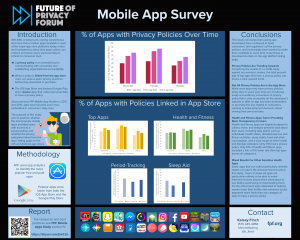Mobile Apps Study Underscores Necessity of Strong Best Practices for Health and Wellness Data
Kelsey Finch, FPF Policy Counsel, presented FPF’s 2016 Mobile Apps Study at the Federal Trade Commission’s annual PrivacyCon on January 12, 2017. Kelsey exhibited a visual representation of the App Study designed by FPF Fellow, Carolina Alonso. See the visual here and below.
The 2016 Mobile Apps Study underscores the necessity of strong Best Practices for health and wellness data. The App Study revealed that while the number of apps that provide privacy policies continues its upward trend from our previous surveys in 2011 and 2012, health and fitness apps – which often control and link to wearable devices, and which can collect sensitive health and wellness data – do worse than average at providing privacy policies. Only 70% of top health and fitness apps had a privacy policy (6% lower than overall top apps), and only 61% linked to it from the app store listing page (10% lower than overall top apps).
Recognizing the need for strong Best Practices, FPF released Best Practices for Consumer Wearables and Wellness Apps and Devices, a detailed set of guidelines that responsible companies can follow to ensure they provide practical privacy protections for consumer-generated health and wellness data. The document was produced with support from the Robert Wood Johnson Foundation and incorporates input from a wide range of stakeholders including companies, advocates, and regulators.




